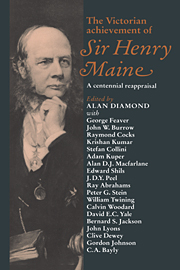Book contents
- Frontmatter
- Contents
- Notes on contributors
- Foreword by Sir John Lyons
- Introduction
- 1 The Victorian values of Sir Henry Maine
- PART 1 MAINE AND THE IDEA OF PROGRESS
- PART 2 MAINE AND THE SOCIAL SCIENCES
- 6 The rise and fall of Maine's patriarchal society
- 7 Some contributions of Maine to history and anthropology
- 8 Henry Sumner Maine in the tradition of the analysis of society
- 9 Maine as an ancestor of the social sciences
- 10 Ancient Law and modern field work
- PART 3 MAINE ON LAW, LEGAL CHANGE AND LEGAL EDUCATION
- PART 4 MAINE AND INDIA
- Appendix: the conference programme
- Bibliography
- Index
10 - Ancient Law and modern field work
Published online by Cambridge University Press: 04 September 2009
- Frontmatter
- Contents
- Notes on contributors
- Foreword by Sir John Lyons
- Introduction
- 1 The Victorian values of Sir Henry Maine
- PART 1 MAINE AND THE IDEA OF PROGRESS
- PART 2 MAINE AND THE SOCIAL SCIENCES
- 6 The rise and fall of Maine's patriarchal society
- 7 Some contributions of Maine to history and anthropology
- 8 Henry Sumner Maine in the tradition of the analysis of society
- 9 Maine as an ancestor of the social sciences
- 10 Ancient Law and modern field work
- PART 3 MAINE ON LAW, LEGAL CHANGE AND LEGAL EDUCATION
- PART 4 MAINE AND INDIA
- Appendix: the conference programme
- Bibliography
- Index
Summary
Like many of the peoples whom they study, anthropologists frequently express their identity in genealogies. Who they are, and sometimes more importantly who they are not, is proclaimed through the intellectual ancestry they cite and pay respect to in their work. Again, like many tribal genealogies, such academic pedigrees are not usually to be taken literally. They are constructed charters, and they are not without some elements of fiction. Names drop out and others are inserted in ways which may reflect the fashions and alignments of the day more accurately than the history of ideas.
The case of Sir Henry Maine marks a partial exception to this common fictive pattern, at least as far as many modern British anthropologists are concerned. Despite an early period of relative neglect, the line of descent through later central figures such as Evans-Pritchard, Fortes, Gluckman, and more recently, Jack Goody, is extremely well attested. Of course, much of the detail of Maine's writing is quite understandably discarded by most modern scholars, and the pessimistic anti-populism of his later years is unattractive to many, including myself. None the less, because of the significance of the contribution which he made to the identification and elucidation of a number of quite fundamental issues, our intellectual relation to him seems to approximate in some degree to the character of ‘universal succession’, which he himself delineated in sharp contrast to the mere inheritance of a few bits and pieces.
- Type
- Chapter
- Information
- The Victorian Achievement of Sir Henry MaineA Centennial Reappraisal, pp. 185 - 192Publisher: Cambridge University PressPrint publication year: 1991



